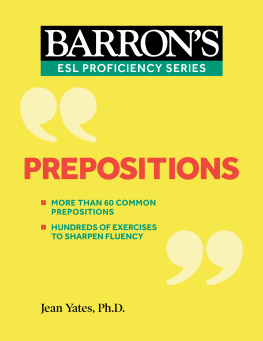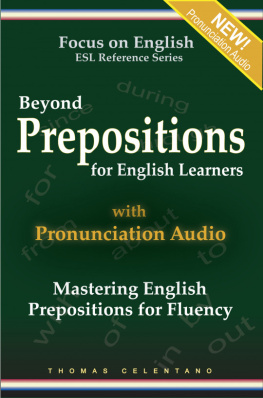Jean Yates - Prepositions
Here you can read online Jean Yates - Prepositions full text of the book (entire story) in english for free. Download pdf and epub, get meaning, cover and reviews about this ebook. year: 2020, publisher: Barrons Educational Series, genre: Children. Description of the work, (preface) as well as reviews are available. Best literature library LitArk.com created for fans of good reading and offers a wide selection of genres:
Romance novel
Science fiction
Adventure
Detective
Science
History
Home and family
Prose
Art
Politics
Computer
Non-fiction
Religion
Business
Children
Humor
Choose a favorite category and find really read worthwhile books. Enjoy immersion in the world of imagination, feel the emotions of the characters or learn something new for yourself, make an fascinating discovery.
- Book:Prepositions
- Author:
- Publisher:Barrons Educational Series
- Genre:
- Year:2020
- Rating:5 / 5
- Favourites:Add to favourites
- Your mark:
- 100
- 1
- 2
- 3
- 4
- 5
Prepositions: summary, description and annotation
We offer to read an annotation, description, summary or preface (depends on what the author of the book "Prepositions" wrote himself). If you haven't found the necessary information about the book — write in the comments, we will try to find it.
Prepositions — read online for free the complete book (whole text) full work
Below is the text of the book, divided by pages. System saving the place of the last page read, allows you to conveniently read the book "Prepositions" online for free, without having to search again every time where you left off. Put a bookmark, and you can go to the page where you finished reading at any time.
Font size:
Interval:
Bookmark:

Acknowledgments
The author would like to thank Debbie Edson at Barrons for the opportunity to create this third edition and for her guidance in the process; professor Marichu Bucelli for her examples of preposition usage in Spanish and Italian, and linguist and professor Bill Zolar for his examples of preposition usage in German, Italian, and Spanish.
Thanks also to the rest of the team at Barrons: Kathryn Malm Bourgoine, Megan Buckman, Joanna Graham, Lauren Manoy, and Angela Tartaro for their insightful suggestions and hard work, especially under difficult conditions during the pandemic.
Copyright 2020, 2011, 1999 by Jean Yates
All rights reserved under International and Pan-American Copyright Conventions. By payment of the required fees, you have been granted the non-exclusive, non-transferable right to access and read the text of this eBook on screen. No part of this text may be reproduced, transmitted, downloaded, decompiled, reverse engineered, or stored in or introduced into any information storage and retrieval system, in any form or by any means, whether electronic or mechanical, now known or hereinafter invented, without the express written permission of the publisher.
Published by Kaplan, Inc., d/b/a Barrons Educational Series
750 Third Avenue
New York, NY 10017
www.barronseduc.com
ISBN: 978-1-5062-6758-6
10 9 8 7 6 5 4 3 2 1
Kaplan, Inc., d/b/a Barrons Educational Series, Inc. print books are available at special quantity discounts to use for sales promotions, employee premiums, or educational purposes. For more information or to purchase books, please call the Simon & Schuster special sales department at 866-506-1949.
Prepositions pose more problems for the non-native speaker or learner of English than any other part of speech. Why? Prepositions are just little words that never change in form; they are pronounced softly, in unstressed syllables; they arent even given capital letters in book titles; native speakers choose the correct ones without thinking. How can they be confusing?
The word preposition has a straightforward definition: a word placed before a noun or pronoun to define its relationship with another word in the sentence. For the learner of English, however, prepositions are anything but straightforward.
Prepositions are difficult, if not impossible, to define without using other prepositions.
Example:
In the sentence, The book is on the table, what does on mean?
On means above and supported by.
In no other language are the prepositions (if they exist at all) the exact equivalents of English prepositions.
Examples:
| Spanish | English |
| Tralo a la basura. | Throw it in the trash. |
| Vamos a la casa de tu hermano. | Lets go to your brothers house. |
| Est a la izquierda. | Its on the left. |
| La celebracin empieza a medianoche. | The celebration starts at midnight. |
| Italian | English |
| Abita a Washington. | He lives in Washington. |
| Penso a te. | Im thinking about/of you. |
| Lui e a llaeroporto. | Hes at the airport. |
| German | English |
| Er wohnt auf der New Jersey Avenue. | He lives on New Jersey Avenue. |
| Er ist auf dem Flughafen. | He is at the airport. |
| Ich denke an dich. | Im thinking about/of you. |
| Werfen Sie es an den Abfall. | Throw it in the trash. |
Many preposition words can also be adverbs or conjunctions.
Examples:
| the preposition down | She walked down the hill. |
| the adverb down | He put the book down . |
| the preposition after | She took a nap after lunch. |
| the conjunction after | She went outside after she put the book down. |
Many prepositions can indicate more than one meaning or relationship.
Examples with after :
| later than | We rested after lunch. |
| in pursuit of | The cat is after the mouse. |
| because of | He was angry after the way she acted. |
| in the style of continuously | This is a painting after Picasso. She worked night after night. |
Two or more prepositions can have the same meaning. Sometimes these prepositions are interchangeable.
Examples:
She is disappointed in her new job.
She is disappointed with her new job.
Sometimes they are not interchangeable.
Examples:
He is fascinated with his new job. (but not in)
He is interested in his new job. (but not with)
He is bored by his new job. (by or with, but not in)
Many prepositions are also used in expressions where their meaning is entirely different from any of their predictable meanings. Expressions like this do not follow any pattern or logic, and do not allow for substitutions. They must be learned as vocabulary units.
Examples:
Its about time .
They are never on time .
She got here in time to see the whole show.
A preposition in combination with another word may have multiple meanings.
Example:
| make up your bed | -arrange |
| make up your face | -paint |
| make up your mind | -decide |
| make up a story | -invent |
| make up a list | -write down |
| make up the difference | -equalize |
| make up last weeks homework | -do overdue work |
| make up for lost time | -compensate |
| make up with your girlfriend | -reestablish a relationship |
Different prepositions can follow the same verb to change its meaning completely.
Example:
| break down | -collapse |
| break in | -enter by force |
| break off | -remove |
| break out | -erupt |
| break out of | -leave by force |
| break through | -establish a successful idea |
| break up | -end a relationship |
New preposition combinations continue to become part of the language.
The following examples are relatively new:
| boot up | -restart a computer |
| key in | -type text on the computer |
| log on | -connect to the Internet |
| act out | -misbehave (traditionally act up) |
| change out | -replace with |
| swap out | -replace with |
| scope out | -make a survey of |
| listen up | -pay attention |
Preposition words are sometimes made into other parts of speech.
Examples:
| prepositions as nouns | I want to learn the ins and outs of prepositions. |
| prepositions as adjectives | The hospital has only a few in patients. There is a down side to his idea. |
| prepositions as verbs | I heard they were upping the price. |
There are some regional differences in preposition usage among native speakers.
Examples:
| Most of the United States: |
Font size:
Interval:
Bookmark:
Similar books «Prepositions»
Look at similar books to Prepositions. We have selected literature similar in name and meaning in the hope of providing readers with more options to find new, interesting, not yet read works.
Discussion, reviews of the book Prepositions and just readers' own opinions. Leave your comments, write what you think about the work, its meaning or the main characters. Specify what exactly you liked and what you didn't like, and why you think so.









